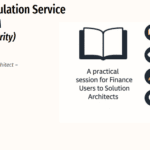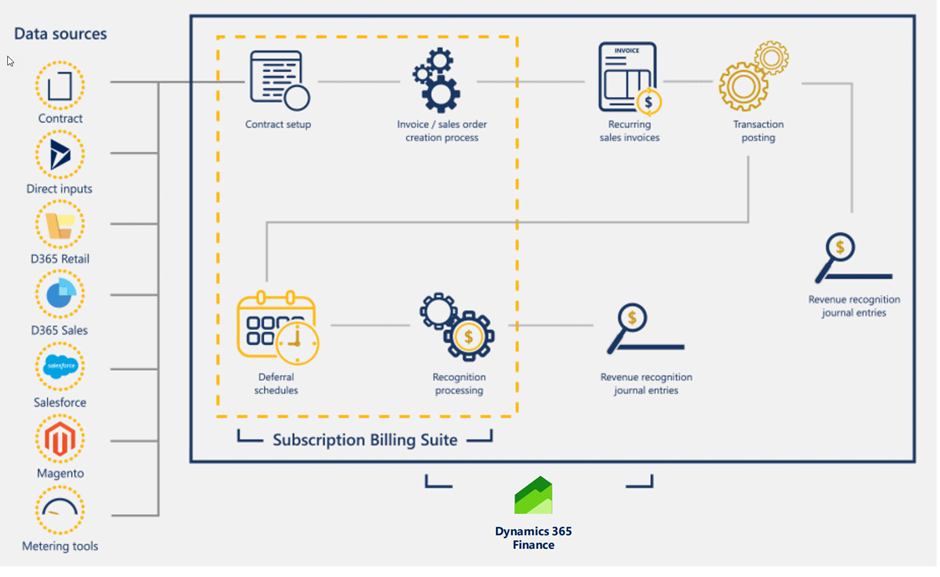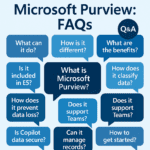

SB501 – Introduction to Subscription Billing in D365 Finance

Table of Contents
ToggleWhat is Subscription Billing?
Subscription Billing is a system that helps businesses manage recurring payments, contracts, and revenue recognition for products and services offered on a subscription basis. Instead of a one-time payment, customers are billed monthly, quarterly, or annually, creating a steady revenue stream.
Microsoft Dynamics 365 Finance and Supply Chain Management (D365 F&SCM) offers a Subscription Billing module designed to manage these complex billing cycles, automate revenue recognition, and ensure compliance with accounting standards like IFRS 15 and ASC 606.
Industries and Use Cases for Subscription Billing
Subscription billing is widely used in industries where products and services are offered on a recurring basis. Here are some key industries and their use cases:
SaaS (Software as a Service)
- Monthly or yearly subscriptions for cloud-based software.
- Usage-based billing for services like cloud storage.
- Example: A CRM software company charges £50 per user per month.
Telecom Providers
- Monthly plans for mobile phones, internet, and TV services.
- Bundled offers (e.g., phone + data plan) with discounts.
- Example: A telecom company offers a £100/month plan for a phone plus 20GB of data.
Leasing Companies
- Recurring billing for leased assets like vehicles, machinery, or equipment.
- Periodic payments with end-of-term buyout options.
- Example: A company leases a forklift for £500/month.
Professional Services (Consulting, Maintenance, Support)
- Monthly retainers for services.
- Annual maintenance contracts (AMC) for software or equipment.
- Example: An IT service company provides monthly support services for £2,000.
Key Functional Areas of Subscription Billing in D365 Finance
The Subscription Billing module in D365 covers the entire lifecycle of a subscription contract, from billing to revenue recognition. Here are its key functional areas:
Recurring Billing Management
- Automatically generates invoices based on billing schedules (monthly, quarterly, yearly).
- Supports fixed charges (e.g., monthly fee) and usage-based charges (e.g., per GB of data).
- Handles mid-cycle changes (e.g., upgrades, downgrades, or cancellations).
Revenue Recognition and Deferrals
- Allocates revenue over time instead of recording it all at once.
- Supports deferred revenue (e.g., billing annually but recognizing monthly).
- Follows IFRS 15 / ASC 606 standards for revenue recognition.
Multiple Element Revenue Allocations (MEA)
- Allocates revenue for bundled offerings (e.g., phone + service plan).
- Splits total revenue into different elements based on their standalone selling prices.
- Helps meet regulatory compliance for revenue reporting.
Contract Lifecycle Management
- Automates contract creation, renewal, and termination.
- Supports adjustments for pricing, contract duration, and customer preferences.
Billing and Accounting Integration
- Integrates with D365 Finance for automatic invoice posting, revenue entries, and financial reporting.
- Updates the General Ledger (GL) automatically for recurring revenue and deferred revenue.
Integration with D365 Finance and Supply Chain Management
The Subscription Billing module integrates seamlessly with other D365 modules, including:
- D365 Finance: For invoicing, revenue recognition, and financial reporting.
- D365 Supply Chain Management: For order management, inventory, and service tracking.
- D365 Customer Engagement: For managing customer subscriptions, contracts, and renewals.
The integration ensures that every subscription transaction is automatically recorded in the general ledger (GL), making audits, reporting, and compliance easier.
Use Case: Telecom Company Selling Phone Plans and Devices
Scenario
A telecom company offers a bundle:
- A smartphone (worth £600 standalone)
- A monthly plan with 20GB data at £50/month for 12 months
- The bundle price: £1,000 (instead of £1,200 if purchased separately)
How Subscription Billing Works in D365
- Contract Creation: A 12-month recurring billing schedule is set up.
- Recurring Billing: The customer is invoiced monthly for £83.33 (£1,000/12).
- Revenue Allocation (MEA): D365 splits the revenue:
- £500 allocated to the smartphone (immediate revenue).
- £500 allocated to the data plan (deferred, recognized monthly).
- Revenue Recognition: Each month, D365 posts £41.67 as service revenue.
- Accounting Integration: All revenue and invoices post directly to the general ledger (GL).
Accounting Entries Example
- At Contract Start:
- Debit: Accounts Receivable £1,000
- Credit: Unearned Revenue (Data Plan) £500
- Credit: Revenue (Smartphone) £500
- Monthly Revenue Recognition:
- Debit: Unearned Revenue (Data Plan) £41.67
- Credit: Service Revenue £41.67
Conclusion
The Subscription Billing module in D365 Finance is a powerful tool for managing recurring revenue streams, ensuring accurate revenue recognition, and handling complex bundled offerings. It integrates smoothly with other D365 modules, providing a complete view of financial performance and ensuring compliance with international accounting standards.
This module is particularly valuable for industries with recurring revenue models, such as SaaS providers, telecom companies, leasing firms, and service providers.
Expand Your Knowledge: See More Subscription Billing Blogs
I am Yogeshkumar Patel, a Microsoft Certified Solution Architect and Enterprise Systems Manager with deep expertise across Dynamics 365 Finance & Supply Chain, Power Platform, Azure, and AI engineering. With over six years of experience, I have led enterprise-scale ERP implementations, AI-driven and agent-enabled automation initiatives, and secure cloud transformations that optimise business operations and decision-making. Holding a Master’s degree from the University of Bedfordshire, I specialise in integrating AI and agentic systems into core business processes streamlining supply chains, automating complex workflows, and enhancing insight-driven decisions through Power BI, orchestration frameworks, and governed AI architectures. Passionate about practical innovation and knowledge sharing, I created AIpowered365 to help businesses and professionals move beyond experimentation and adopt real-world, enterprise-ready AI and agent-driven solutions as part of their digital transformation journey. 📩 Let’s Connect: LinkedIn | Email 🚀




















Post Comment